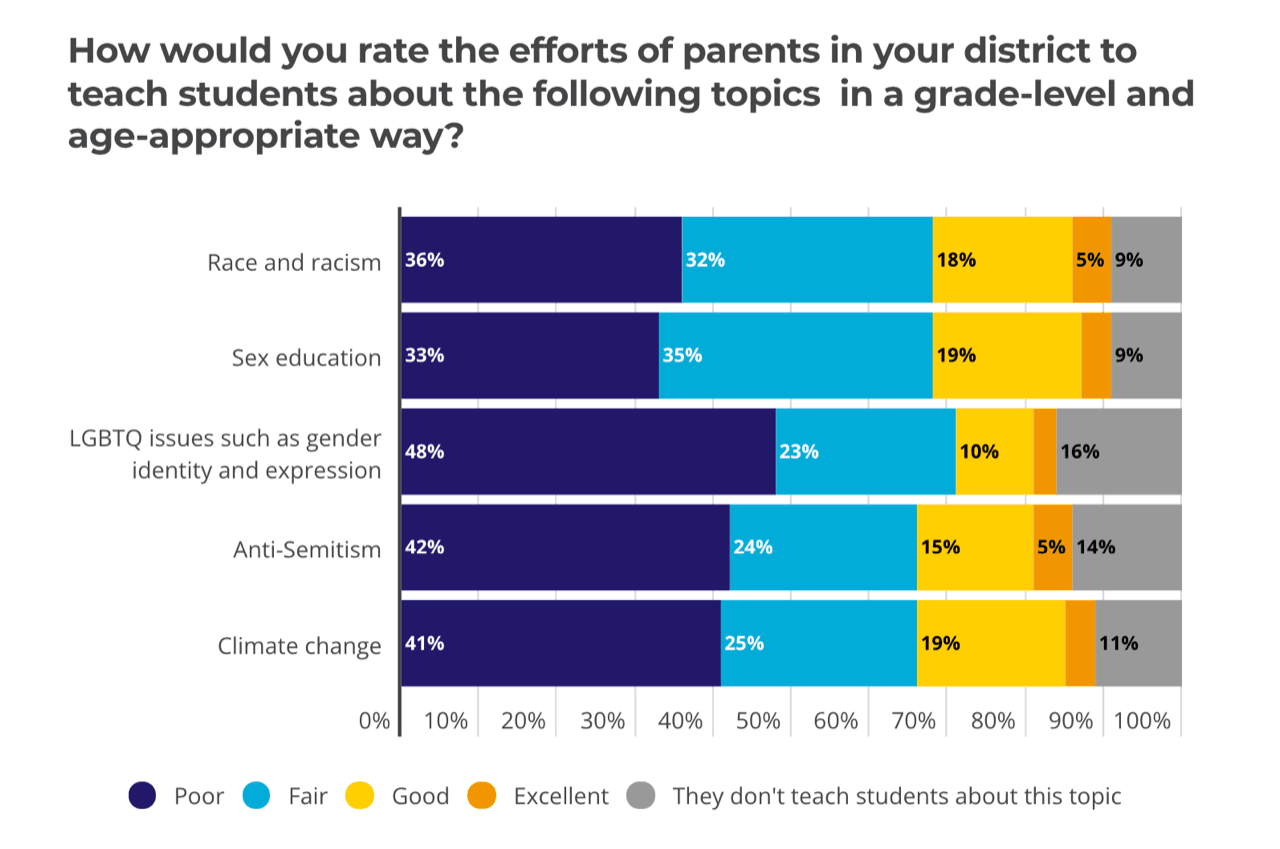A survey released Friday found that when K-12 school district leaders and teachers were asked about parents’ ability to teach their children about controversial issues, the majority rated parents as either “poor” or “fair.”
Education Week’s research center published a “nationally representative” survey of the views of 1,300 school district leaders and teachers.
Educators are divided over whether they believe parents want them to teach about racism, homophobia and anti-Semitism, according to an EdWeek survey. https://t.co/EY1Z42ajB2
— Education Week (@educationweek) December 17, 2021
When asked to rate the efforts of parents in their districts to teach their children about various controversial issues “in a grade-level and age-appropriate way,” in all of the topics presented in the survey, the majority of the district leaders and teachers rated parents as either “poor” or “fair” in their ability to teach their children.
For example, 36 percent rated parents as “poor” instructors on the topic of “race and racism,” and 32 percent rated parents as “fair.” Only 18 percent rated them as “good,” and 5 percent as “excellent.”
On the issue of sex education, 33 percent of district officials and teachers rated parents as “poor” instructors of their children, and 35 percent rated them as “fair.” Only 19 percent rated parents as “good” teachers of sex education.
Of those surveyed, 48 percent rated parents as “poor” teachers of LGBTQ issues and gender ideology, and 23 percent rated them as “fair.” Only 10 percent rated parents as “good.”
On the topic of antisemitism, 42 percent of the school leaders and teachers rated parents as “poor” instructors, and 24 percent rated them as “fair.” In contrast, 15 percent rated parents as “good” teachers while 5 percent rated them as “excellent.”
When asked to rate parents as instructors of climate change, 41 percent of those surveyed rated them as “poor,” and 25 percent rated them as “fair.” However, 19 percent rated them as “good.”
Former Gov. Terry McAuliffe, who persistently denies CRT exists in schools, oversaw the Education Dept. in 2015 when it encouraged using CRT. https://t.co/481zaMLyyS
— Breitbart News (@BreitbartNews) October 17, 2021
The survey also asked school leaders and teachers about parents’ involvement in deciding curriculum and materials.
Results indicated 63 percent said parents should be involved, with 50 percent stating parents should be “somewhat involved” in the selection, and 13 percent saying they should be “very involved.”
In contrast, 16 percent said parents should be “very uninvolved,” while 21 percent said they should be “somewhat uninvolved.”
While some Democrats pretend racist Critical Race Theory (CRT) doesn't even exist, others are fighting hard for it. https://t.co/nr3u1zpI4T
— Breitbart News (@BreitbartNews) November 7, 2021
Assessing the actual state of parent involvement in their own schools, 39 percent of the leaders and teachers said parents are currently “very uninvolved,” while 29 percent said they are “somewhat uninvolved.” But, 27 percent said they are “somewhat involved,” and 4 percent said they are “very involved.”
Among those surveyed, 18 percent “completely oppose” parents being allowed to opt their children out of class material of which they disapprove, while 28 percent “somewhat oppose.”
In contrast, 29 percent of the school leaders and teachers “somewhat support” allowing parents to opt their children out, while 25 percent “completely support” the practice.


COMMENTS
Please let us know if you're having issues with commenting.